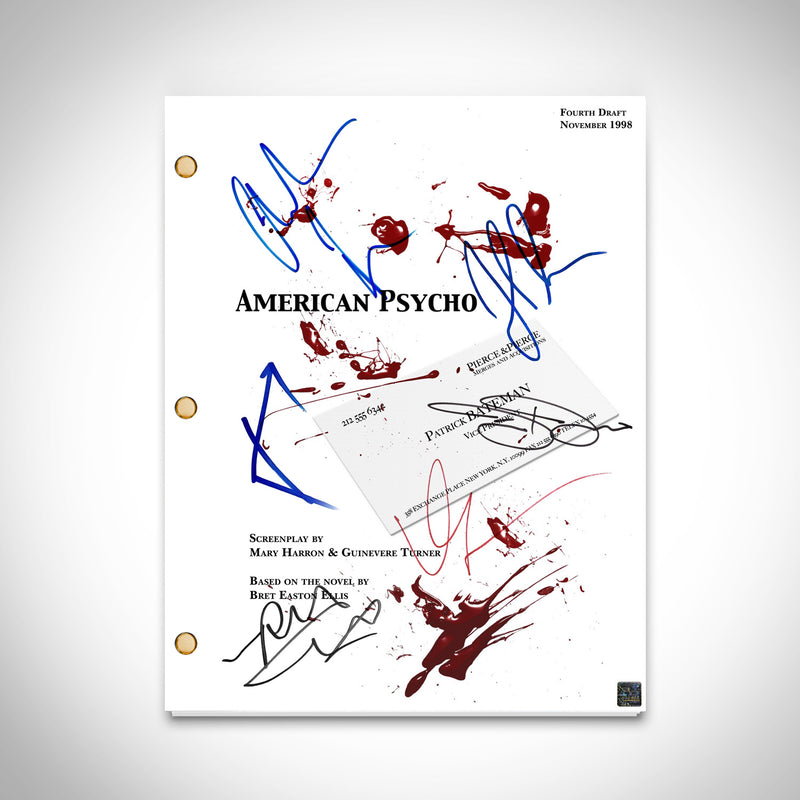
Bateman is Harvard-educated, rich, and handsome. 7 The film chronicles the life of Patrick Bateman, a young Wall Street businessman. Mary Harron s 2000 film adaptation of Bret Easton Ellis s 1991 novel, American Psycho, comments on the disruption between the signifier and signified that marked the Reagan era. 6 This separation between Reagan s image and substance enabled him to signify reliability despite his rather unreliable political actions and their consequences.
#American Psycho Script Pdf tv
Robert Dallek incisively calls him the first true Prop President, one whose real self is the image on the TV screen and whose shadow self is the man in the White House. 5 As Reagan s statement quoted in the epigraph implies, the facts simply could not compete with his carefully constructed image. According to David Harvey, The triumph of aesthetics over ethics could not be plainer. 4 As evidenced by his re-election in 1984 and popularity when he left office, Reagan s likable image overshadowed his often unpopular actions. Another poll found that nearly a third of those interviewed disapproved of Reagan s policies, yet personally liked him. In February 1982, for example, only 47% of the national population Travis Vogan: Inside Doesn t Matter 208ģ approved of the way Ronald Reagan is handling his job as President, yet 70% approved of him as a person. Though most Americans did not trust his word or even agree with his policies, they did trust his public image.

But how could Reagan have a 64 per cent approval rating when 86 per cent of Americans apparently did not trust his word? There was thus a disjunction between his public image s signification and his actual performance as president that enabled him simultaneously to be the most and least successful president since Roosevelt. 3 Regardless of his dishonesty and his policies disastrous economic effects, Reagan left office in 1988 with a 64 per cent approval rating the highest of any President since Franklin Roosevelt (who is incidentally remembered for ameliorating the Depression s economic effects through the development of social programmes).

By the end of 1982, over 10 per cent of the American population was unemployed the largest percentage since the Great Depression.

Despite Reagan s ostensible intention to lift all boats through free-market capitalism s supposedly trickle-down benefits, unemployment actually rose during his administration. Thus, a classist sentiment informed Reaganomics as the administration s economic philosophy is called that cast welfare programmes as factors contributing to social ills, and taxes as unfairly supporting the unemployed at the expense of productive or working taxpayers. His administration operated according to the logic that stimulating the private sector rather than supporting public programmes would optimize economic opportunity for all classes, or, lift all boats to prosperity. Reagan s social policies, however, remained seemingly indifferent to this privation. 2 In addition to Reagan s perceived dishonesty, his presidency marked a period of economic hardship for lower- and working-class Americans. 1 Despite his assertion of truthfulness, polls indicated that only fourteen per cent of Americans believed his statement. He opens his speech by stating, I know you ve been reading, seeing, and hearing a lot of stories the past several days.Well, now you re Travis Vogan: Inside Doesn t Matter 207Ģ going to hear the facts from a White House source. A week later, however, he admitted that weapons were transferred to Iran, but persisted in his denial that the transfer was made to negotiate for the release of American hostages. Reagan initially denied the allegations completely.

This act, if it was indeed done for the above-mentioned reasons, contradicted Reagan s vehement promise never to negotiate with terrorists and was in defiance of the Boland Amendment, which restricted support to Nicaragua. The 1986 Iran Contra scandal, for instance, involved members of Reagan s administration selling Iran arms, allegedly to aid the release of US hostages in Lebanon and to fund anti-communist Nicaraguan guerillas with the profits. Brian Massumi, Parables for the Virtual Ronald Reagan s greatest strengths as President are perhaps most interestingly examined through his greatest failures. Ronald Reagan, 1988 Republican Convention All the world will be a stage, with Reagan in the leading role as carrier of a dehumanizing contagion. 1 TRAVIS VOGAN Inside Doesn t Matter: Ronald Reagan and American Psycho Facts are stupid things.


 0 kommentar(er)
0 kommentar(er)
